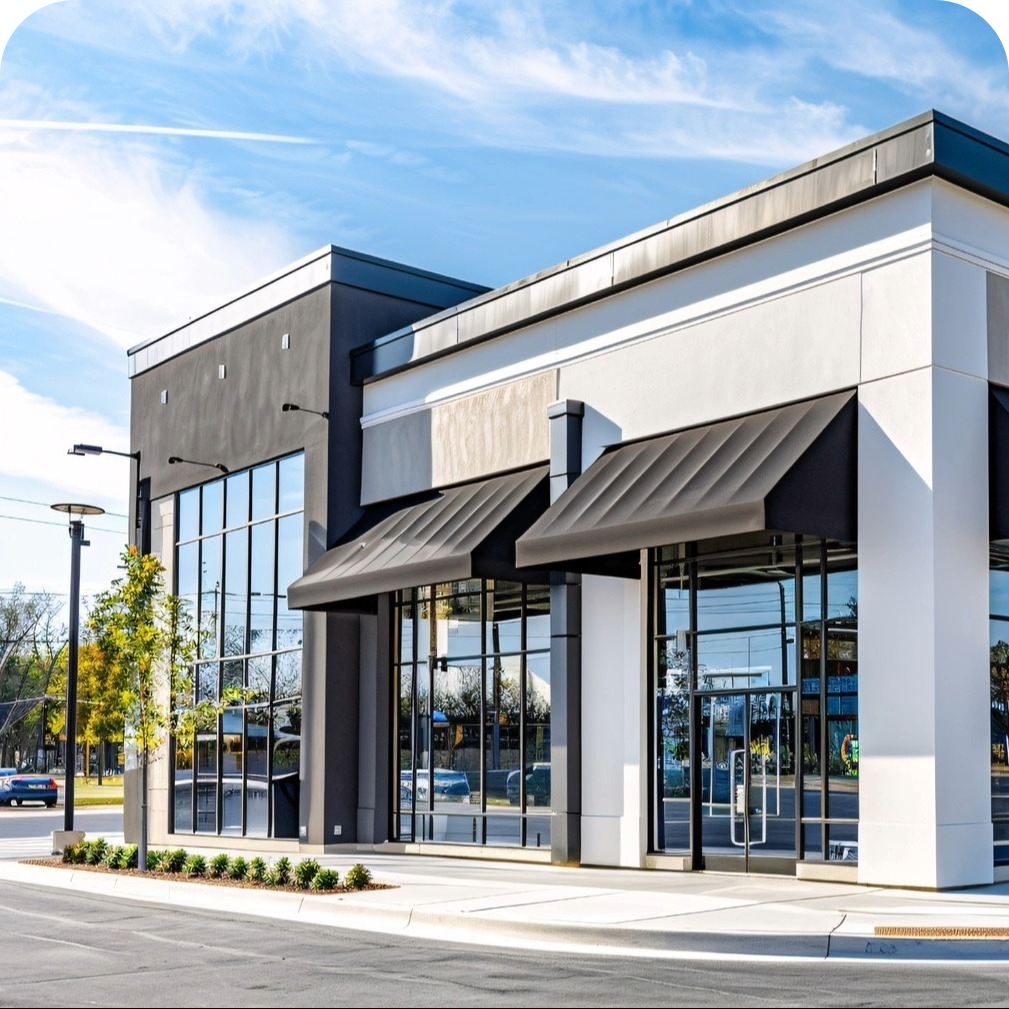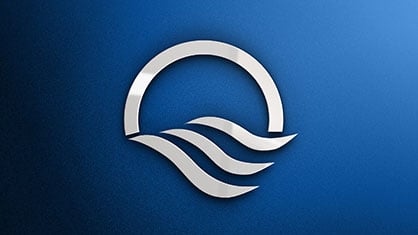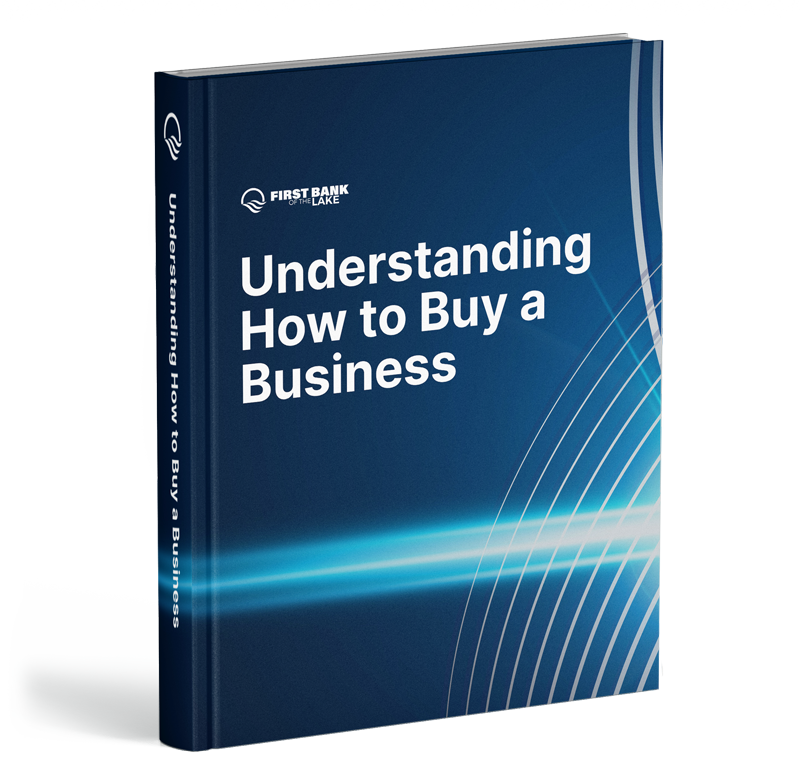Work with a bank that gets deals done
Getting your business loan shouldn’t be confusing, slow or full of red tape.

It's easy get started.
Fill Out The Form
Tell us a bit about your business and your goals using our form. It only takes 3 minutes.
Talk To Your Specialist
One of our experienced SBA Loan specialists will reach out to learn more about your plans and walk you through your financing options.
Apply with Confidence
If it’s a good fit, we’ll help you gather the necessary documents and put together a complete SBA loan package to move your project forward.
Funding options that fit the way you do business.
Whether you’re buying, building, or growing your business, we have financing options for almost every situation. At First Bank of the Lake, we specialize in helping business owners get the funding they need. Whether you’re just getting started or ready to take things to the next level, we make business lending simple and approachable.

Buying Your First Business

Expanding to More Locations

Buying a Franchise That’s Already Up and Running

Upgrading or Remodeling Your Location

Let's see if we're a good fit.
If you're considering an SBA loan through First Bank of the Lake, here are the common minimum requirements we’ll look at during the application process.
You Meet SBA Eligibility
Most small businesses qualify! We’ll confirm that your business operates in the U.S. and meets the SBA’s basic size and industry guidelines.
Ready to Invest in Your Own Success
Many SBA loans require an equity injection of 10%. This can come from your own funds, franchise fees or, seller financing and more.
A Personal Credit Score over 680
A healthy credit score shows lenders that you manage your finances responsibly — a great sign your business is ready to borrow with confidence.
A Solid Business Background
We look for experience, steady financials, or proven management skills—anything that shows you’re ready to lead your business with confidence.
Real business owners. Real results.
See how First Bank of the Lake helped turn their business dreams into reality.

Woof Gang Bakery
After years in HR, Kasia followed her passion for animals and, with a $345K SBA loan from First Bank of the Lake, quickly launched her Woof Gang Bakery & Grooming franchise — already nearing breakeven just months in.
Read More
Tint World
After losing his wife, a friend, and his life savings, Dan Billings reinvented his life with a Tint World franchise — and with guidance and an SBA loan from First Bank of the Lake, his business is thriving and he’s already eyeing a second location.
Read More
Lifetime Green Coatings
Father and son duo Barry and Parker Norfleet launched six Lifetime Green Coatings franchises with a $400K SBA loan from First Bank of the Lake — quickly setting up operations and nearly breaking even within just three months.
Read More"We were in overtime with one minute left in the game. I was astonished we were able to get my SBA loan done with First Bank of the Lake in so little time."
Isaac and Shannon Reed
Reed’s Moving & Storage
"I don’t think the process with First Bank of the Lake could have been better, smoother, or quicker."
Barry and Parker Norfleet
Lifetime Green Coatings
"It happened so fast with First Bank of the Lake. I met Erik on October 11th; the loan application went to underwriting on October 23rd, and by November 9th, I was approved."
Kasia Anderson
Woof Gang Bakery & Grooming
"First Bank of the Lake was the best banking experience I have ever had, and they would be my first call for my next business loan. I would give them an A+."
Andy
Winter Park Ski Rental
"The process was as easy as it could be, and transparency and reliability were key. The level of service at First Bank of the Lake was just superb. I would give them an ‘A’ on my SBA loan experience."
Tyler Green
Freelite AZ
"My First Bank of the Lake rep was great. Easily the finest banker I’ve dealt with in my life - and one of the best human beings I’ve ever met."
Dan Billings
Tint World
"Everyone told me not to do it and that it would take forever, but that wasn’t my experience at all. It only took three months to close on the $3.6 million loan."
Radojica “Rock” Katnic
Perfect Moving

What makes First Bank of the Lake different?
First Bank of the Lake understands how essential growing businesses are to fueling local economies and that not all businesses qualify for conventional business loans. That’s why we offer government-guaranteed Small Business Administration (SBA) 7a and 504 loans.
$1.9 Billion+
In SBA business funding provided since 2020 — helping entrepreneurs across the country grow and thrive.*
2,000+
SBA loans funded since 2020, supporting business owners at every stage of their journey.
Top 5
SBA franchise lender Recognized nationally for helping franchise owners open and expand with confidence.
350+
Franchise brands financed across a wide range of industries — from food service to fitness and beyond.
$600 Million+
Franchise Loans Invested to help entrepreneurs launch and scale proven franchise businesses.
Top 19
Most active SBA 7(a) Lender nationwide as of July 2025.*

See if You Pre-Qualify Today.
Tell us a bit about your business goals and we’ll help you find the right path forward.



Business Acquisition Loans: Frequently Asked Questions
Buying an existing business presents several advantages over starting a new venture. It offers an instant customer base, established cash flow, and existing infrastructure, which can significantly shorten the learning curve and ramp-up time typically associated with startups. You also acquire trained employees, pre-existing vendor relationships, and a recognized brand, contributing to immediate momentum. While it may come with a higher price tag and potential hidden issues (like aging equipment or outstanding debts), proper due diligence and a match to your skills can lead to a less risky and more immediately profitable entrepreneurial path.
Successful business acquisition begins with thorough preparation. First, assess your personal goals, skills, and lifestyle preferences to clarify the type of business that suits you best. Next, set a realistic budget and get your finances in order, including reviewing your credit score (aim for 650+ for SBA loans) and accumulating funds for a down payment (typically 10-20%). Prepare essential documentation like personal financial statements, tax returns, a resume, and a draft business plan with financial projections. Finally, build a team of advisors, including an attorney and an accountant experienced in business sales, and consider consulting an SBA lender or SCORE mentor for early guidance.
Potential buyers typically find businesses through several channels. Business brokers specialize in connecting buyers and sellers, offering listings and guidance. Online marketplaces like BizBuySell or BizQuest also host listings, allowing filtering by industry, location, and price. Networking with professionals and direct outreach to owners of businesses you're interested in can uncover unadvertised opportunities. Lastly, for those open to it, franchise opportunities, including resales of existing units, can be found via the SBA Franchise Directory or franchise brokers. Once a promising business is found, request at least the last 2-3 years of financial statements or tax returns and an overview of operations, usually after signing a non-disclosure agreement.
To determine a fair price for a potential acquisition, businesses are often valued using multiple methods. A Cash Flow Analysis Valuation Model assesses the seller's discretionary cash flow or EBITDA to determine how much debt the business can support. A Comparable Sales Valuation Model looks at recent sales of similar businesses to establish reasonable multiples of earnings or revenue. An Asset-Based Valuation Model evaluates tangible assets (equipment, inventory, real estate) and intangible assets (brand, customer lists).
Beyond valuation, thorough due diligence involves a deep dive into the business's health:
- Financial Review: Examining detailed financial records for accuracy and consistency, identifying liabilities.
- Operational Due Diligence: Understanding daily operations, reviewing contracts, leases, and employee situations, and ensuring necessary licenses and permits can be transferred.
- Legal and Compliance: Having an attorney review legal matters, regulations, intellectual property, and checking for liens.
- Physical Assets: Inspecting real estate and equipment, including environmental assessments if applicable, and assessing inventory.
- Human Resources: Identifying key employees and planning for their retention or the owner's transition. This comprehensive investigation helps verify seller claims and uncover any hidden issues.
Several financing options exist to acquire a business, often used in combination:
- SBA Loans: Government-guaranteed loans (like the 7(a) and 504 programs) offered by banks, known for lower down payments and longer repayment terms.
- Traditional Bank Loans: Standard commercial loans from banks, typically requiring higher down payments and shorter terms.
- Seller Financing: The seller finances a portion of the purchase price, allowing the buyer to pay them back over time. This can reduce upfront cash needed and demonstrate the seller's confidence in the business.
- Personal Funds and Investment: Using personal savings, home equity loans, or bringing in outside investors for capital in exchange for equity.
- Retirement Funds (ROBS): A specialized option allowing the use of 401(k) or IRA funds without immediate tax penalties, though it carries significant risk.
Starting conversations with lenders early is recommended to understand potential loan amounts and criteria.
The SBA offers two primary loan programs for business acquisitions, each with distinct features:
SBA 7(a) Loan: This is the most flexible and common choice for small business acquisitions. It can lend up to $5 million and covers the purchase price, real estate, equipment, working capital, inventory, and closing costs. It requires a relatively low down payment (typically 10%) and offers long repayment terms (up to 10 years for general business purposes, up to 25 years if real estate is included). Qualification is generally easier due to the SBA guarantee, making it accessible to more entrepreneurs who might not meet conventional loan criteria. It's ideal for deals where a significant portion of the value is goodwill or working capital.
SBA 504 Loan: This loan is specifically designed for financing major fixed assets, primarily commercial real estate or large equipment, to promote business growth and job creation. It's structured as a partnership: 50% bank loan, 40% CDC (Certified Development Company) loan (backed by SBA), and 10% borrower down payment. The CDC portion can go up to $5.5 million, allowing for larger total project financing than the 7(a). It offers long-term, fixed interest rates on the CDC portion. However, 504 funds cannot be used for working capital, inventory, or goodwill. It's best suited for asset-heavy acquisitions like manufacturing plants or hotels where the real estate or equipment constitutes a large part of the purchase. A combination of both 7(a) and 504 loans might be used for complex deals involving both substantial fixed assets and goodwill.
To qualify for an SBA loan, both the borrower and the target business must meet specific criteria. For the borrower, a personal credit score of 680 or higher is generally recommended (though some lenders may accept 660+), along with a clean personal financial history free of significant bankruptcies or federal debt delinquencies. Buyers must provide a down payment of at least 10% of the total project cost, often a combination of cash and seller financing.
The business being acquired must demonstrate sufficient historical cash flow to comfortably repay the loan, typically a debt service coverage ratio (DSCR) of 1.15 to 1.25 times. Lenders will examine the business's financial statements and tax returns for the past three years, plus future projections. The buyer also needs a strong business plan outlining their strategy for operations and growth, and relevant management or industry experience. While collateral helps, SBA loans are not solely declined due to inadequate collateral if the application is otherwise strong. However, a personal guarantee from the owner(s) is almost always required. Additionally, the seller generally cannot retain ownership after a full buyout, and the buyer must actively manage the business.
The process of securing an SBA loan to buy a business involves several key steps and generally takes 30 to 90 days.
Choose the Right SBA Loan Program: Determine if a 7(a) loan (most common for acquisitions) or a 504 loan (for significant fixed assets) is best suited for your needs.
Find an SBA Lender: Seek out banks or credit unions experienced in SBA business acquisition loans, preferably SBA Preferred Lenders who can approve loans in-house. Tools like the SBA’s Lender Match can help.
Complete the Loan Application and Provide Documentation: Submit a comprehensive package including SBA loan forms, personal and business financial statements (historical and projected), your business plan, the purchase agreement, and personal documents (ID, resume). An independent business valuation or real estate appraisal may also be required.
Lender Review and Credit Decision: The lender’s underwriting team will analyze all information, check credit, and evaluate risk. They may request additional information. Upon satisfaction, the lender issues a loan commitment, then notifies the SBA for a loan number or submits the package for SBA approval. This stage typically takes a few weeks.
Closing the Loan: Once approved, you'll satisfy any remaining conditions from the commitment letter (e.g., life insurance, seller subordination agreements). At closing, you'll sign numerous legal documents including the loan agreement, promissory note, security agreements, and personal guarantee forms. Funds are then disbursed, and the business ownership is officially transferred.
The entire process, from application to funding, usually spans 1 to 3 months, varying based on deal complexity and responsiveness to requests.
Have more questions? Download our free 42-page guide.

Ready to Talk? We’re Ready to Help.
Tell us a bit about your business — we’ll help you find the right path.
All loans are subject to credit approval. Restrictions and limitations may apply. First Bank of the Lake does not provide tax, legal or investment advice. All decisions concerning these matters should be made in conjunction with your professional advisors.

